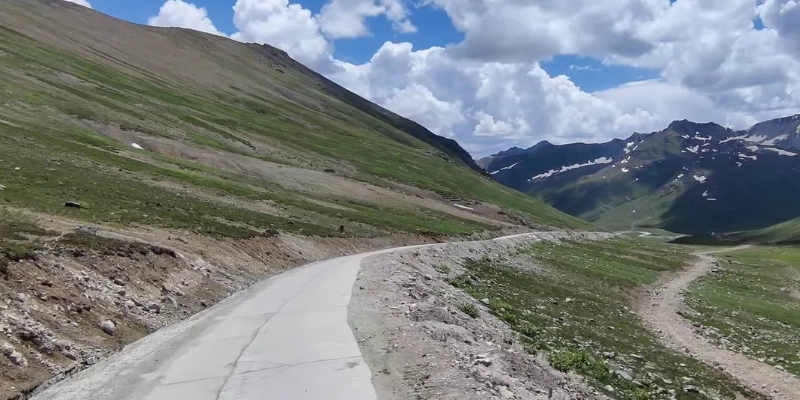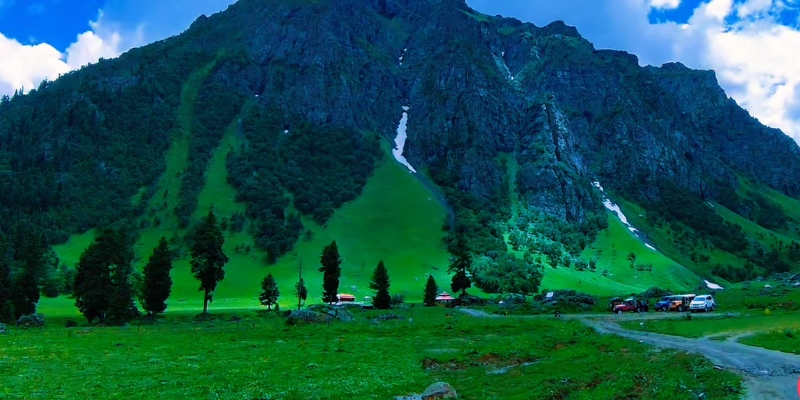Astore Valley – Hidden Gems of Northern Pakistan
Published: 03/04/2025
Astore Valley is one of those places that feels calm and far away from the busy world. I didn’t know much about it before going, just that it had lakes, mountains, and some peaceful spots. But once I reached there, I realized how quiet and beautiful it really is. There aren’t big crowds or loud places. Just fresh air, open views, and a simple kind of beauty.
I didn’t plan every detail before the trip. Whether you’re coming from Islamabad, Naran, or Skardu, the road to Astore is a little tough but full of amazing views. It’s not an easy trip, but it’s worth it. You’ll feel like you’ve gone somewhere special.
In this guide, I’ll share what I saw, what I learned, and why I think Astore is a great place to visit. From the small streets of Astore town to the peaceful areas like Domel, every part has its own charm. If you like quiet places and nature, you’ll enjoy this valley.
So, are you ready?
Where is Astore Valley?
Astore Valley lies in the Astore District of Gilgit-Baltistan, a region famous for its rugged landscapes and sky-high peaks. If you’re wondering about the Astore Valley distance from Islamabad, it’s roughly 550–600 kilometers via KKH, or, depending on your route, it takes about 10–12 hours by road.

From Skardu, the Astore Valley distance is around 100–120 kilometers, a scenic 4–5-hour drive. For those coming from Naran to Astore Valley, it’s about 260 kilometers via the Babusar Pass, a thrilling 6–8-hour journey when the pass is open (usually June to October).
Sitting at an Astore Valley elevation of around 2,600 meters (8,530 feet), this spot offers cool weather and crisp mountain air.
The Road to Astore Valley
The Wadi Astore road is an adventure in itself. Starting from the Karakoram Highway at Raikot Bridge, you’ll cruise along a carpeted road for about 30 minutes until you hit Astore Chowk.
Turn right here, and you’re on your way! The drive from the chowk to Astore village takes around 2 hours, winding through dramatic cliffs and green hills. The road is mostly paved, though some stretches can get bumpy, perfect for a sturdy car or motorcycle.
Good news for travelers: the route to Deosai National Park, a gem near Astore, has recently reopened, making it easier to explore this snow-draped wonderland.

A Peek into Astore Village and Beyond
Astore village sits right in the middle of the valley. It’s a small town, but it has everything you need to get started, some basic shops, a police station if you need help with directions, and kind people who’ll talk to you in Urdu or Shina. I found it simple but welcoming, the kind of place where locals nod and smile even if they don’t know you.
From here, it’s easy to head out to nearby spots like Domail (or Domel, depending on how people spell it). This place is something else: green fields, clean rivers, and skies full of soft white clouds. It honestly felt like I was looking at a painting.
Astore Valley, Gilgit-Baltistan, is packed with jaw-dropping spots. Here are some highlights:
- Rama Lake: A 25-minute trek from Astore Meadow leads you to this green-water beauty, a perfect introduction to hiking trails in Astore. Camping here is highly recommended.
- Deosai National Park: Known as the “Roof of the World,” it’s a short drive away, with frozen Sheosar Lake and snowy plains that scream adventure.
- Nanga Parbat Base Camp: A trekker’s dream, offering views of the mighty Rupal Face, one of the world’s steepest mountain walls.
- Minimerg and Domel: These sub-valleys are pure magic; think waterfalls, tall peaks, and flower-filled meadows.
- Allah Wali Lake and Kala Pani: Lesser-known but equally gorgeous, ideal for quiet picnics.
- Astore to Rupal Valley: A rugged path leading to Nanga Parbat’s southern side, perfect for hardcore explorers.
Weather in Astore Valley
The weather in Astore Valley is a big part of its charm. Summers (June to August) are mild, with temperatures between 15–25°C, great for hiking and camping. Spring brings colorful blooms, while autumn paints the valley in golden hues.
Winters (December to March) drop below freezing, blanketing the area in snow, especially around Deosai. Pack layers, regardless of season, as mountain weather can shift fast!

Hotels and Camping in Astore Valley
Looking for an Astore Valley hotel? Options are simple but cozy. In Astore village, you’ll find guesthouses like PTDC Motel Astore or local stays offering basic rooms and warm meals; think daal and fresh naan.
Prices range from PKR 2,000–5,000 per night. For a real treat, though, camping in Astore Valley is the way to go. Pitch a tent at Astore Meadow or by Rama Lake, surrounded by starry skies and silence. Just bring your gear, as rentals are limited.
Culture and Languages
Wadi e Astore’s culture is a beautiful mix of traditions. The people here, from Astore village to Domel, are known for their hospitality. Urdu is widely spoken, but Shina, a local language, adds a unique flavor to daily life.
You might catch folk songs or see traditional wooden homes, a nod to the region’s heritage. Festivals and simple village feasts often bring communities together, especially in summer.

Why Astore Valley, Pakistan, Stands Out
Astore Valley, Gilgit, isn’t just about pretty views; it’s a masterpiece of nature. Towering peaks like Laila Peak and Chongra loom over the landscape, while waterfalls cascade through forests of pine and cedar.
The valley’s location near Nanga Parbat, the “Killer Mountain,” adds a thrill for mountaineers. Whether you’re sipping water from a sweet spring or gazing at rainbow-hued lakes, every moment here feels like a gift.
| How to Plan Your Trip |
|---|
|
Final Thoughts
Astore Valley is the kind of place that stays with you. From the quiet streets of Astore village to the green, peaceful land of Domel, every stop has something to remember. Whether you’re walking through high mountain paths, sitting near a cold stream, or just watching the clouds move, it all feels real and calming.
If you’re thinking about visiting, don’t overthink it. The road might be long, but the peace you’ll find there makes it worth every hour. And if you’re not sure where to begin, feel free to ask, I’ll be glad to help however I can.
FAQs About Astore Valley
Getting to Astore Valley is easy for beginners, starting from Islamabad and taking the Karakoram Highway (KKH) toward Chilas, then turning at Astore Chowk. It’s about a 10–12-hour drive, or you can take a bus to Gilgit and hire a local jeep from there. Check road conditions ahead, as mountain routes can be tricky for first-timers.
The best time is May to October, when the weather is mild (15–25°C) and perfect for exploring lakes and meadows. Winter (December to March) is cold and snowy, great if you love snow, but harder for travel. Spring and autumn offer colorful views, so pick based on what you enjoy!
Yes, Astore village has simple hotels like the PTDC Motel, costing PKR 2,000–5,000 per night with basic rooms and food. Camping is popular too, especially at Rama Lake or Astore Meadow, if you bring your own tent. Hotels are limited, so book early or plan to rough it outdoors!
Pack warm clothes (jackets, socks) since it gets chilly, even in summer, plus comfy trekking shoes for walking. Bring a water bottle, snacks, and a camera; beginners often forget how remote it can be. If camping, a sleeping bag and a tent are must-haves.
The Astore Valley road is mostly paved and safe, but some parts are narrow or bumpy, so drive slowly if you’re new to it. Check for updates on weather or landslides, especially in winter, to avoid trouble. Locals are helpful if you get stuck; just ask!
Astore village is the main town where you’ll find shops and guesthouses, like a base camp for your trip. Domel (or Domail) Astore Valley is a quieter, scenic sub-valley nearby, famous for its greenery and peaceful vibes. Think of Domel as the countryside escape from the village hub!
Yes, you can travel from Naran to Astore Valley via the Babusar Pass, about 200 kilometers away. It takes 6–8 hours by car, but the pass is only open from June to October due to snow. It’s a stunning drive, so plan it for summer if you’re a beginner.
Yes, Astore Valley has beautiful waterfalls, especially around Minimerg and Domel, flowing through forests and mountains. They’re not huge like Manthoka waterfall, but their natural charm makes them perfect for photos or a quick stop. Pack a raincoat if you want to get close; they can splash!
The trek from Astore to Rupal Valley is tough; it’s rugged and steep, better for intermediate hikers with some experience. Beginners can still try shorter walks, like to Rama Lake, which takes 25 minutes from the glacier. For Rupal, hire a guide and start small to build your skills!

- Be Respectful
- Stay Relevant
- Stay Positive
- True Feedback
- Encourage Discussion
- Avoid Spamming
- No Fake News
- Don't Copy-Paste
- No Personal Attacks

- Be Respectful
- Stay Relevant
- Stay Positive
- True Feedback
- Encourage Discussion
- Avoid Spamming
- No Fake News
- Don't Copy-Paste
- No Personal Attacks



